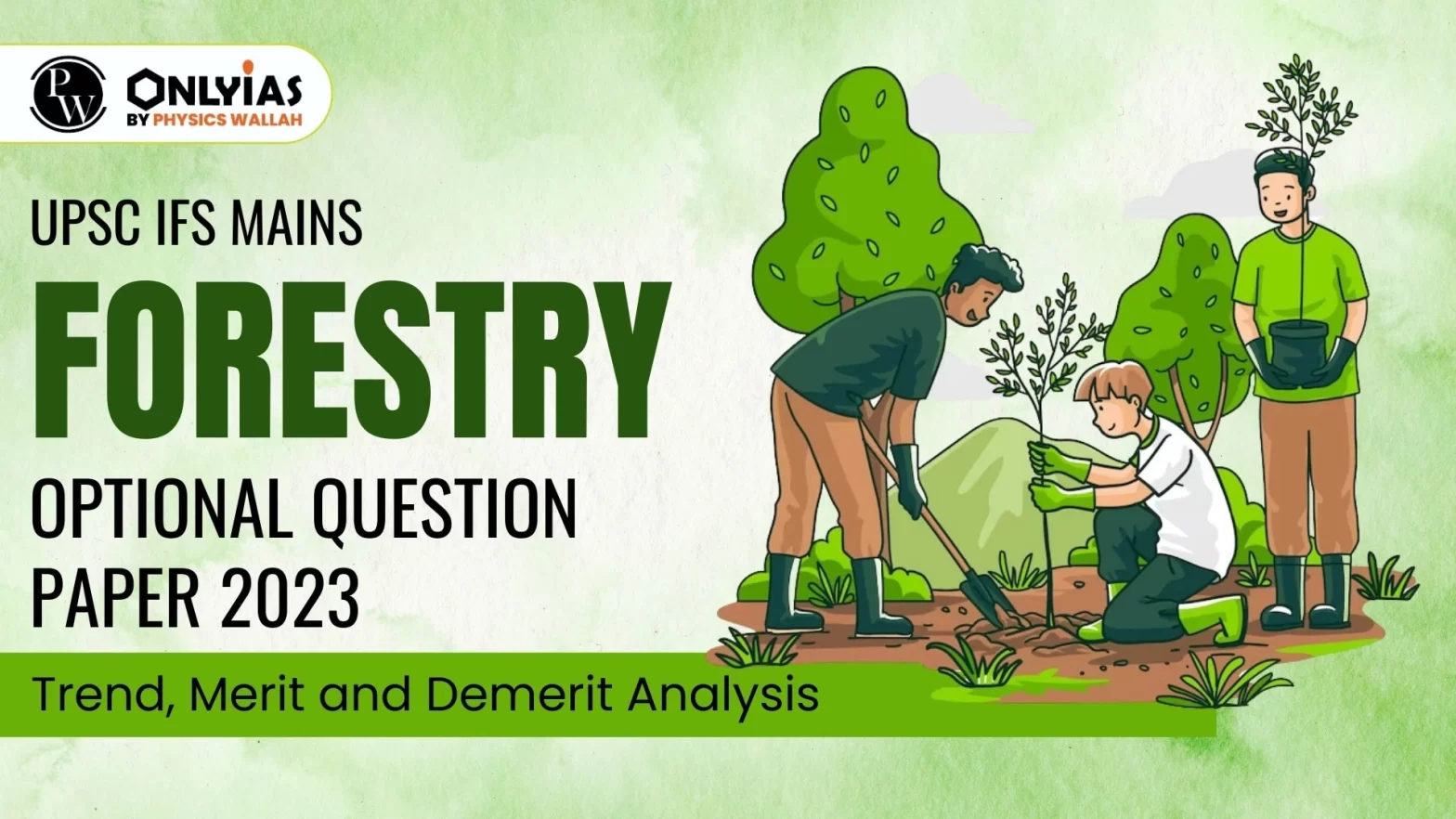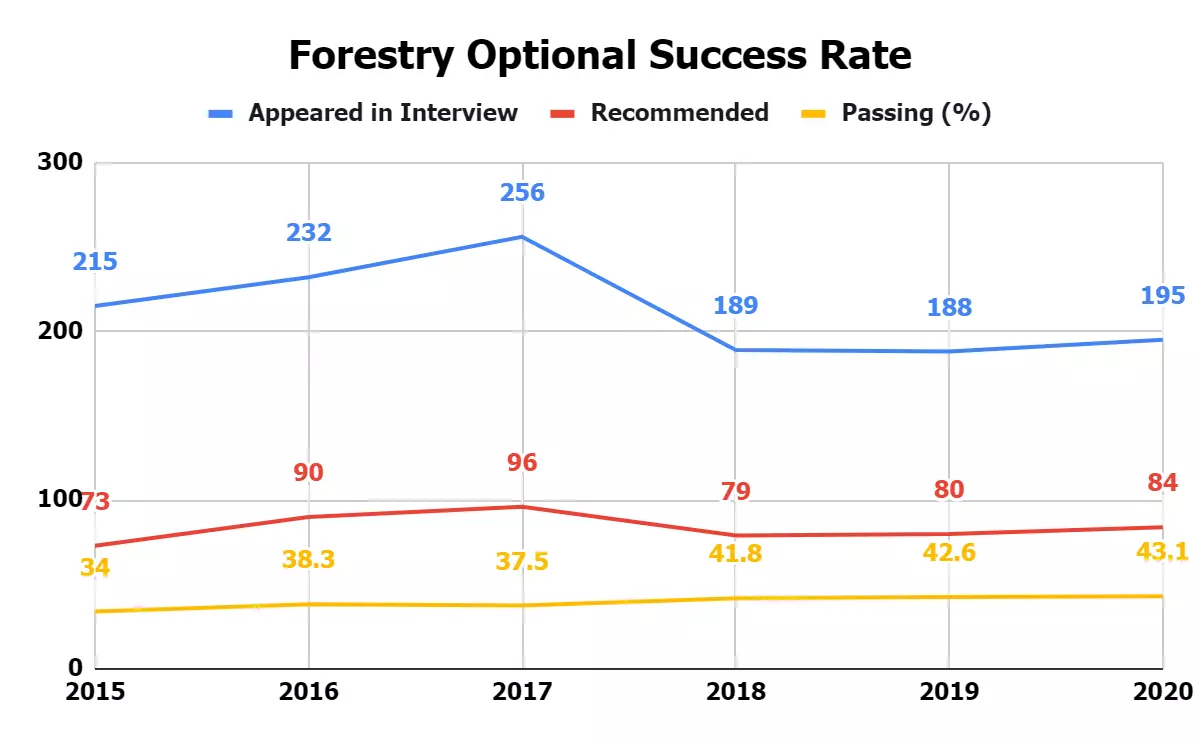The strategic significance of UPSC Forestry Optional Paper in UPSC IFS Mains, with insights into its scoring potential, paper format, and trend analysis. Unlocking success with a comprehensive overview, including exam overview, success rates, and expert-recommended booklist for effective preparation

The UPSC IFS mains include a total of six papers with a total of 1400 marks. Out of 6 papers one paper is of English and one on General Knowledge. The remaining four papers (Paper I, Paper II, Paper III and Paper IV) cover optional subjects that candidates have chosen during the application form filling process. Although Paper I and Paper II have a maximum of 300 marks each, the remaining 800 marks of the mains examination depend on the optional subjects. It becomes very crucial to choose the right optional subject and adopt the right strategy so that candidates can score as much as possible. So in this article we will first explore the importance and weightage of optionals, and then we will analyze Forestry optional as an optional subject.
| 2023 IFS Forestry Optional Paper-01, Download Pdf
2023 IFS Forestry Optional Paper-02, Download Pdf |
In UPSC IFS mains examination candidates have to choose two optional subjects from the list specified in the official notification unlike UPSC IAS mains exam in which candidate has to choose only one optional subject. In IFS exam optional subjects have very high scoring potential because after Paper I and Paper II which consist of 600 marks optional have 800 marks so here optional plays a decisive role in determining your selection as well as to achieve a good rank.

It is evident that in the entire selection process, the optional subject plays a crucial role in preparing for the UPSC IFS exam, as it accounts for almost 48% of the total marks. This substantial portion contributes significantly to the overall evaluation of the entire exam.

Upon further magnification, we can conclude that in the IFS mains examination, the optional section carries almost 58% of the total mains marks. Therefore, scoring well in the optional section, along with Paper I and Paper II, will result in higher overall marks in the exam.
In the UPSC IFS Mains examination, Forestry optional subjects include two papers, specifically Paper I and Paper II. Each of these papers have a maximum weightage of 200 marks, which makes a total of 400 marks for this optional subject. Among the various optional subjects mentioned by UPSC in IFS, Forestry is one of the 14 optional subjects available to candidates.
| Forestry | Syllabus of Forestry Optional |
| Paper I of Forestry Optional Question Paper | Silviculture
|
| Paper II of Forestry Optional Question Paper |
|
UPSC Forestry Optional Question Papers from 2018 to 2022 are readily available for aspirants seeking to enhance their preparation. We provided access to the UPSC IFS Forestry optional question papers in PDF format, an invaluable resource for your preparation.
| Year | Paper |
|---|---|
| UPSC IFS Forestry Optional Question Paper 2018 | Download Paper I |
| UPSC IFS Forestry Optional Question Paper 2019 | Download Paper I |
| UPSC IFS Forestry Optional Question Paper 2020 | Download Paper I |
| UPSC IFS Forestry Optional Question Paper 2021 | Download Paper I |
| UPSC IFS Forestry Optional Question Paper 2022 | Download Paper I |
Candidates appearing for the UPSC (Union Public Service Commission) IFS examination must make a thoughtful decision while selecting their optional subject, as it holds substantial weightage in the evaluation process. With a total of 800 marks allotted, the optional subject carries approximately 48% of the combined marks for both the written exam and the personality test (interview).
Forestry Optional Success: Insightful IFS Examination Rates
The table below offers a comprehensive overview of the success rate achieved by candidates who opted for Forestry optional as their optional.
| Year | Number of Candidates of Forestry Optional | ||
|---|---|---|---|
| Appeared in Interview | Recommended | Passing (%) | |
| 2015 | 215 | 73 | 34 |
| 2016 | 232 | 90 | 38.3 |
| 2017 | 256 | 96 | 37.5 |
| 2018 | 189 | 79 | 41.8 |
| 2019 | 188 | 80 | 42.6 |
| 2020 | 195 | 84 | 43.1 |

By examining the past papers of the Forestry Optional, we can identify a trend in the types of questions asked. There is also a noticeable shift in the themes of the questions. Understanding the UPSC IFS Forestry Question Paper Trend Analysis is advantageous, as it allows candidates to streamline their preparation effectively and enhance their performance in this optional subject.
Pros of Forestry Optional Subject: Choosing Physics as Your UPSC Optional
Cons of Forestry Optional Subject: Choosing Physics as Your UPSC Optional
Please note that before selecting Forestry Paper as your optional subject, carefully weigh these disadvantages against the advantages and consider your own background, interests, and the time you can dedicate to preparation.
| Must Read | |
| NCERT Notes For UPSC | UPSC Daily Current Affairs |
| UPSC Blogs | UPSC Daily Editorials |
| Daily Current Affairs Quiz | Daily Main Answer Writing |
| UPSC Mains Previous Year Papers | UPSC Test Series 2024 |
Scoring in any subject depends on many factors like availability of resources, guidance, prior knowledge and right strategy. If candidates have all these options accessible then yes any subject is scoring.
There are two papers of Forestry subject each paper divided into two parts.
No, as per the official notification of the UPSC Candidate can choose both subjects.
<div class="new-fform">
</div>